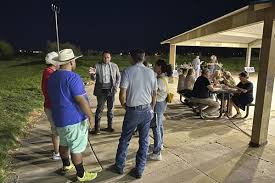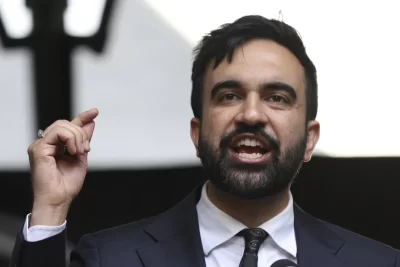
SUNLAND PARK, N.M. — The politics of immigration look different from the back patio of Ardovino’s Desert Crossing restaurant.
That’s where Robert Ardovino sees a Border Patrol horse trailer rumbling across his property on a sweltering summer morning. It’s where a surveillance helicopter traces a line in the sky, and a nearby Border Patrol agent paces a desert gully littered with castoff water bottles and clothing.
It’s also where a steady stream of weary people, often escorted by smugglers, scale a border wall or the slopes of Mount Cristo Rey and step into an uncertain future. It’s a stretch of desert where reports of people dying of exhaustion and exposure have become commonplace.
“It’s very obvious to me, being on the border, that it’s not an open border. It is a very, very, very difficult situation,” said Ardovino, who pays for private fencing topped by concertina wire to route migrants around a restaurant and vintage aluminum trailers that he rents to overnight guests.
“I wish the facts would rule this conversation, and being here, I know they do not.”
As immigration politics have moved to the forefront of this year’s presidential election, they’ve dominated contests across the country for congressional seats that could determine which party controls Congress. But the urgency of the situation is greater in some districts than others.
Three of 11 congressional district races along the southern U.S. border are hotly-contested rematches in districts that flipped in 2022 with the election of Democratic Rep. Gabe Vasquez in New Mexico and Republican Reps. Juan Ciscomani in Arizona and Monica De La Cruz in Texas.
A partner in a decades-old family business, Ardovino lives in one border district in Texas and works in Vasquez’s district in New Mexico. He was disappointed by the collapse in February of a bipartisan border bill in Washington, and he bristles at politicians talking from afar about an “open border.”
What he wants, more than anything, is a collective fix — one that doesn’t diminish the work of border agents or gloss over real-world challenges like migrants fleeing dictators.
“It’s frustrating for people who need a border bill of any kind, any time, to start dealing with the big picture,” Ardovino said. “I’d rather be running a restaurant than working on these fences.”
Democrats touting border solutions
Early voting starts Oct. 8 in Sunland Park, on the edge of a whiplashed congressional district that flipped in 2018, 2020 and again in 2022 with the election of Vasquez.
Democrats in Congress are promoting border enforcement as seldom before, including a half-dozen bills from Vasquez. He touts his knowledge of the region as the U.S.-born son of immigrants with relatives on both sides of the border.
“With migrant activity along the border, we have had to adjust our approach,” said Vasquez. “I can say here that the sky is blue for 50 years, but when it turns red, you have to admit that it’s turning red.”
Here, border politics are literally matters of life and death. Federal and local authorities describe a new humanitarian crisis along New Mexico’s nearly 180-mile portion of the border, where migrant deaths from heat exposure have surged and merciless smuggling cartels inflict havoc.
Where Doña Ana County shares a 45-mile stretch of border with Mexico, the sheriff’s department reported 78 lifeless migrant bodies found between January and mid-August.
“The death toll, in my 21 years of working with the Doña Ana sheriff’s department, we have not had this,” said Major Jon Day.
In the Texas race, Democratic challenger Michelle Vallejo has taken a hard line on border enforcement, shocking progressive allies in her campaign to unseat De La Cruz. A recent ad from Vallejo describes “chaos at the border” and urges bipartisan cooperation to deploy more Border Patrol agents and fight human trafficking cartels.
‘A responsibility to enforce the law’
In Arizona’s 6th Congressional District, Republican incumbent Ciscomani calls border enforcement his No. 1 priority. But he has distanced himself from former President Donald Trump’s sometimes caustic anti-immigrant rhetoric and avoided presidential campaign events in swing-state Arizona. Instead, Ciscomani tells an immigrant’s story — about his own arrival in the U.S. at age 11 from Hermosillo, Mexico. He received citizenship in 2006 and says he is determined to fix the border.
Experts say voters near the border have tangible concerns about smugglers and contraband but know the benefits of authorized cross-border commerce and commuting.
“There is, I think, more of a nuanced view,” said Samara Klar, a pollster and professor at the University of Arizona School of Government and Public Policy.




